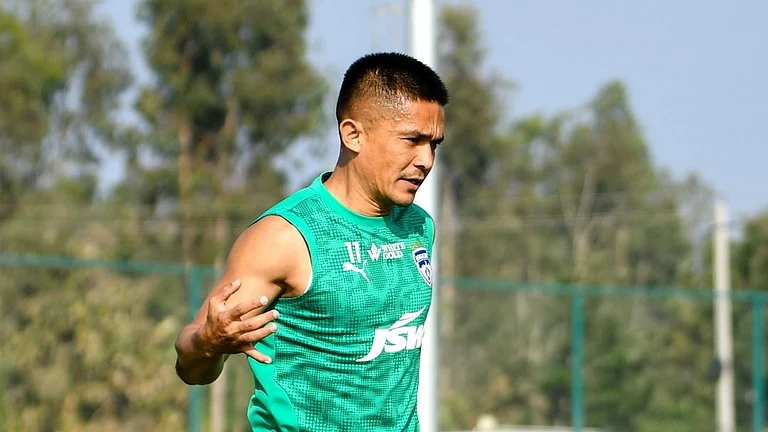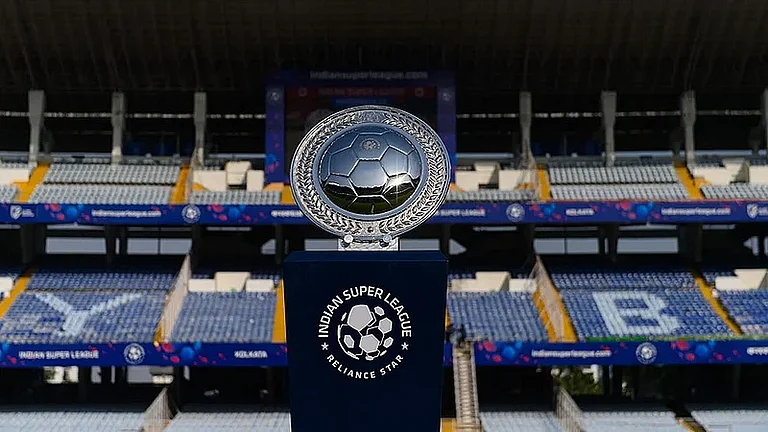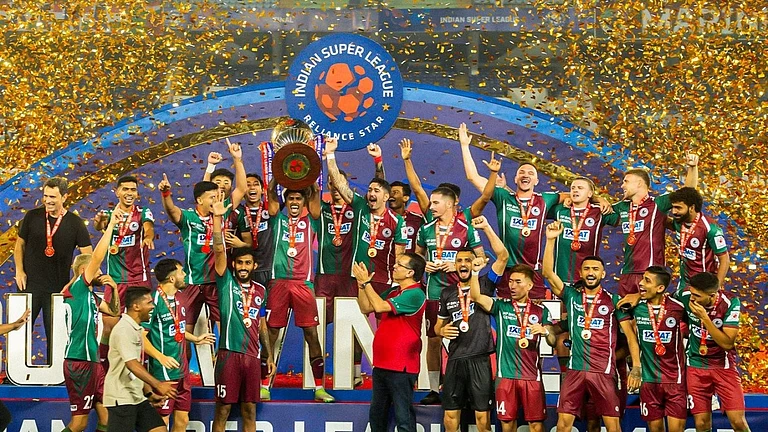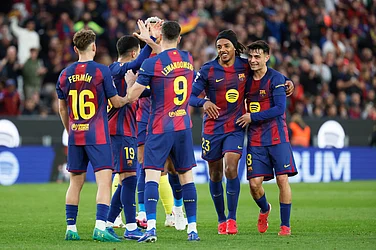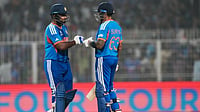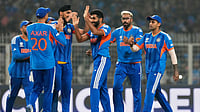Indian football icon Sunil Chhetri expressed deep concern over the indefinite suspension of the Indian Super League (ISL). A contentious Master Rights Agreement (MRA) dispute has plunged the 2025-26 season into uncertainty, leaving players, staff, and stakeholders worried about their livelihoods.
Chhetri Voiced Profound Concern For Indian Football
Sunil Chhetri, India's celebrated football captain, spoke out Wednesday (on July 16, 2025), sharing his profound concern about the suspension of the ISL, the country’s top-tier football league. He highlighted the worrying state of the sport's future. Chhetri described the entire Indian football ecosystem as 'worried, hurt, and scared' by the uncertainty.
The 40-year-old striker received numerous messages from players, support staff, and other stakeholders, all apprehensive about their livelihoods. The crisis affects everyone, from kitmen and physiotherapists to operations personnel.
Initially, Chhetri welcomed a two-week pre-season delay for personal fitness. However, he expressed dismay when it became an indefinite suspension. He called for unity, stating: "We'll ride this storm together. Stick together and look out for each other. Keep training... Football has to resume soon. It will."
Master Rights Agreement Dispute Halts ISL Season
The 2025-26 ISL season is on hold due to unresolved negotiations over the MRA between Football Sports Development Limited (FSDL) and the All India Football Federation (AIFF). The current 15-year MRA, signed in 2010, expires on December 8, 2025. This timing severely restricted operational planning. FSDL, a joint venture of Reliance Industries (65%) and Star India (35%), informed clubs that it could not 'effectively plan, organise, or commercialise' the season without contractual clarity.
Adding to the complexity, the Supreme Court of India directed AIFF not to finalise any agreement during its review of the federation's constitution. This legal intervention stalled FSDL's proposed new ownership model, which reportedly suggested 60% club ownership, 26% for FSDL, and 14% for AIFF. In response, AIFF presented its own annual payment plan.
ISL's Journey, FSDL's Fiscal Role, And Investment Impact
Launched in October 2013 by IMG-Reliance, Star Sports, and AIFF, the Indian Super League aimed to elevate Indian football through a franchise model, apparently inspired by the uber success of the Indian Premier League, now arguably the biggest and richest T20 cricket league. The inaugural 2014 season featured eight city-based teams with marquee players such as Robert Pires and David Trezeguet among the star cast, and Atletico de Kolkata won the title.
Over the next decade, the league expanded to 13 clubs and gained recognition as India's top-tier competition in October 2019, after a contentious merger proposal with the I-League. The 2024-25 season featured 14 teams, including Punjab FC as the first side promoted from the I-League, highlighting the league's growth trajectory before the current crisis.
This suspension marks the first operational halt in the league's 11-year history, disrupting a calendar that traditionally spans September to April. FSDL operates as a commercial subsidiary of Reliance Industries, established to manage the ISL under its 2010 agreement with AIFF.
As commercial partners, FSDL pays AIFF INR 50 crore annually (approximately USD 5.8 million) for comprehensive rights, including league operations, broadcasting, and national team commercialisation. The AIFF, as India's governing football body, sanctions competitions but relies heavily on FSDL's infrastructure investment, which includes grassroots development and stadium refurbishment across 11 venues.
This relationship now appears on the brink of collapse. According to reports, FSDL claims AIFF's delayed responses to MRA renewal proposals, submitted in March 2025, created insurmountable obstacles to planning. The federation maintains it cannot negotiate, citing the Supreme Court's directive, but stated: "AIFF and its stakeholders will take all possible steps to ensure ISL continuity."
Sunil Chhetri's Enduring Legacy And The League's Uncertain Future
Sunil Chhetri's career exemplifies the impact of the ISL on Indian football. Since joining Bengaluru FC in 2017, he has become the league's all-time top scorer with 75 goals in 183 appearances. His 2024-25 campaign included 14 goals in 28 matches, featuring a record-breaking hat-trick against Kerala Blasters that made him the oldest player to achieve the feat.
Beyond club success, Chhetri is India's most-capped player (with 150 appearances) and the all-time leading scorer (94 goals), ranking third globally among active international goal-scorers, behind Cristiano Ronaldo and Lionel Messi.
Though he retired internationally in June 2024, Chhetri reversed his decision in March 2025 to bolster the national team. His seven AIFF Player of the Year awards and the 2021 Khel Ratna—India's highest sporting honour—reflect his unparalleled influence.
Larger Impact And Possible Resolution
It's widely reported that the suspension threatens over 2,000 direct livelihoods, including players, medical staff, broadcast crews, and stadium operators.
Clubs like Mohun Bagan SG face increased challenges, needing to prepare for the AFC Champions League without domestic matches. The crisis also hinders youth development; FSDL's grassroots programmes trained over 10,000 children annually.
Financially, the INR 50 crore annual investment from FSDL to AIFF—critical for national teams and refereeing initiatives—now faces disruption. Historically, this funding transformed infrastructure, with an estimated 60% of ISL venues undergoing FSDL-funded renovations since 2014. Stakeholders worry about a return to pre-ISL eras, where minimal investment stifled professionalism.
AIFF President Kalyan Chaubey emphasised respecting 'the law of the land' and assured stakeholders of resolution efforts. However, with Supreme Court deliberations ongoing and no negotiated settlement, the 2025-26 season remains in limbo.
And ultimately, resolution hinges on two interconnected factors: Supreme Court approval of AIFF's constitution and subsequent MRA negotiations. Legal experts expect a verdict by August could enable an October league start if AIFF and FSDL compromise.
It's argued that the FSDL's reported proposed club-centric ownership model aims for sustainability, addressing long-standing grievances about revenue distribution, while AIFF's counterproposal offers simpler financial continuity. Historical precedent favours resolution—the 2017 AFC approval of concurrent ISL/I-League operations resolved earlier conflicts.
Chhetri's advocacy may prompt stakeholder pressure; his 2017 plea filled Mumbai's football arena for a national team match. Should negotiations fail, AIFF may temporarily operate the league, despite lacking FSDL's production capabilities. Chhetri's rallying cry—'Keep training... It will resume'—epitomises the resilience required to navigate this storm.



